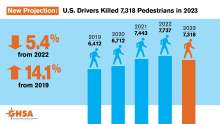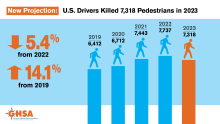New research shows a drop in motorcyclist deaths in the US. The figures compiled for the Governors Highway Safety Association (GHSA) show a 7% drop in motorcyclist fatalities in the US in 2013, compared with data for the previous year. However, the GHSA cautions that poor weather in 2013 may have had an effect, reducing the total distance travelled by motorcyclists and therefore the numbers of crashes. Research shows 2013 to be only the second year since 1997 in which there has been a drop in motorcyclist d
New research shows a drop in motorcyclist deaths in the US. The figures compiled for the 5188 Governors Highway Safety Association (GHSA) show a 7% drop in motorcyclist fatalities in the US in 2013, compared with data for the previous year. However, the GHSA cautions that poor weather in 2013 may have had an effect, reducing the total distance travelled by motorcyclists and therefore the numbers of crashes. Research shows 2013 to be only the second year since 1997 in which there has been a drop in motorcyclist deaths in the US. Compared with the first nine months of 2012, motorcyclist deaths over the same period in 2013 were lower in 35 states and the District of Columbia, higher in 13 states, and the same in two states, according to preliminary data. But the report suggests that weather and not improved riding habits or other safety measures was the main reason for the safety gain. The first six months of 2012 were unusually warm and dry across the United States and offered good riding weather, while the first nine months of 2013 were cooler and wetter.
The total projected number of motorcyclist deaths in 2013 is 4,610, compared with 4,957 in 2012 and 4,612 in 2011, according to the report. The 7% drop between 2012 and 2013 is about twice that of the overall decrease in US traffic deaths in the first nine months of 2013. However, motorcycle crashes in 2011 resulted in six times more rider/passenger deaths/registered vehicle than cars, the report noted. It also said that car occupants were twice as safe in 2011 as they were in 1997, but motorcyclist safety did not improve during that time. A significant reduction in motorcyclist deaths could be achieved if all states had universal helmet laws, according to Kendell Poole, GHSA chairman and director of the Tennessee Office of Highway Safety. "By far, helmets are the single most effective way to prevent serious injury and death in the event of a motorcycle crash. But states are going backward when it comes to enacting this proven, lifesaving countermeasure," he said.
Only 19 states and the District of Columbia require all riders to wear helmets, another 28 require riders younger than ages 21 or 18 to wear helmets, and three states have no helmet laws. In 2012, there were 10 times more deaths of helmetless motorcyclists in states without universal helmet laws than in states with such laws, according to the US2467 National Highway Traffic Safety Administration. Nationwide, helmet use fell from 66% in 2011 to 60% in 2012.
Other measures that could make motorcycling less dangerous include a tougher stance on drunk driving, as in 2011 29% of fatally injured riders had a blood alcohol level above the legal limit. Speeding is a factor in 35 percent of fatal crashes, and close to 50% of those crashes did not involve another vehicle. In addition, motorcycle training courses may not be provided at locations and times convenient for riders, although some training is provided in all states. And there is a need to ensure motorcyclists are licensed. In 2011, 22% of motorcycle riders involved in fatal crashes did not have a valid motorcycle license, while only 12% of passenger vehicle drivers involved in fatal crashes lacked a valid license. Meanwhile when motorcyclists are in crashes with other vehicles, the motorcyclist's right of way has typically been violated. Some states conduct "Share The Road" campaigns, to increase awareness of motorcyclists.
The total projected number of motorcyclist deaths in 2013 is 4,610, compared with 4,957 in 2012 and 4,612 in 2011, according to the report. The 7% drop between 2012 and 2013 is about twice that of the overall decrease in US traffic deaths in the first nine months of 2013. However, motorcycle crashes in 2011 resulted in six times more rider/passenger deaths/registered vehicle than cars, the report noted. It also said that car occupants were twice as safe in 2011 as they were in 1997, but motorcyclist safety did not improve during that time. A significant reduction in motorcyclist deaths could be achieved if all states had universal helmet laws, according to Kendell Poole, GHSA chairman and director of the Tennessee Office of Highway Safety. "By far, helmets are the single most effective way to prevent serious injury and death in the event of a motorcycle crash. But states are going backward when it comes to enacting this proven, lifesaving countermeasure," he said.
Only 19 states and the District of Columbia require all riders to wear helmets, another 28 require riders younger than ages 21 or 18 to wear helmets, and three states have no helmet laws. In 2012, there were 10 times more deaths of helmetless motorcyclists in states without universal helmet laws than in states with such laws, according to the US
Other measures that could make motorcycling less dangerous include a tougher stance on drunk driving, as in 2011 29% of fatally injured riders had a blood alcohol level above the legal limit. Speeding is a factor in 35 percent of fatal crashes, and close to 50% of those crashes did not involve another vehicle. In addition, motorcycle training courses may not be provided at locations and times convenient for riders, although some training is provided in all states. And there is a need to ensure motorcyclists are licensed. In 2011, 22% of motorcycle riders involved in fatal crashes did not have a valid motorcycle license, while only 12% of passenger vehicle drivers involved in fatal crashes lacked a valid license. Meanwhile when motorcyclists are in crashes with other vehicles, the motorcyclist's right of way has typically been violated. Some states conduct "Share The Road" campaigns, to increase awareness of motorcyclists.






